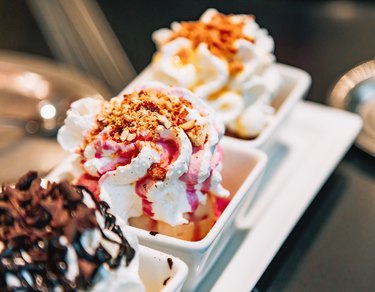
You're on a diet, trying to lose X pounds before Y date and, therefore, have cleared your social calendar in hopes of reducing any exorbitant eating or drinking occasions. Sound familiar?
For many, dining out and weight loss are mutually exclusive. And we get it — the odds are stacked against you when it comes to eating out and trying to be healthy, let alone lose weight.
Video of the Day
Video of the Day
Indeed, a January 2020 study in the Journal of Nutrition revealed some somber stats when it comes to eating at your favorite restaurants: Researchers found that 70 percent of the fast-food we eat is of poor diet quality, and half of all meals at full-service restaurants are poor in nutritional quality.
But enough with the bad news. Here's the good: You can still eat out on a diet. To prove it, we polled seven dietitians (including yours truly) for their top tips to help you navigate dining out, from before you even walk through the door to after you're done eating (yes, there's more you can do there, too!).
Read more: Trying to Lose Weight? These Is the One Food Group You Should Probably Cut (No, It's Not Carbs)
Before Dining Out
1. Be on the Planning Committee
"There are some restaurants where it's nearly impossible to order well. Others are much easier," says DJ Blatner, RDN, author of The Superfood Swap. "So make sure you are part of the planning committee in choosing the place you go!"
Blatner suggests looking for the following on the menu, so you know you'll have some healthy options:
- Side salads
- Veggie-rich meals
- Small portions or a la carte versions of your favorites (think side of meatballs or a single enchilada)
2. Make a Plan Before You're Out the Door
After your duties on the planning committee are over, peruse the menu and set a plan for what you're going to order. It's easier to make a healthier choice when you're a) not hungry, and b) not tempted by what your friends or significant other might be ordering.
Make a plan, but be flexible. If something's not available or if you change your mind, it's OK — just be aware of your choices and why you're making them.

When You’re Dining Out
3. Remember Where You Are
"If you're at a diner, don't order the seasonal salad or seafood platter. Go for what they're known for so you can enjoy the best food they can make," says Maggie Moon, RD, best-selling author of The MIND Diet.
Moon adds that you can upgrade to healthier choices within those selections, like grilled chicken rather than fried, whole-grain toast instead of white and extra veggies in your salad or omelet.
4. Pick Your Favorite 'One Extra'
"Dining out gets extra tricky because in addition to your main, there's alcohol plus appetizers plus dessert," Blatner says. "Aim to pick only one of those extras (your favorite): drink, appetizer or dessert."
5. Skip the Entree
"Try ordering sides instead of an entree. For example, when dining at a Mexican restaurant, order a double side of grilled veggies, a side of black beans and a side of guac," recommends Cynthia Sass, MPH, RD, author of Slim Down Now: Shed Pounds and Inches with Pulses — The New Superfood. "It'll leave you feeling full, satisfied and energized, and it'll be less expensive than the meat-based taco salad (served in a fried shell) or the veggie fajitas that came with extras (rice, cheese, sour cream tortillas)."
6. Swap Veggies for Apps
"Rather than ordering an appetizer and an entrée, plan to order a side of vegetables in addition to your entrée — then play the role of chef and incorporate that veggie side directly into your meal," says Jackie Newgent, RDN, culinary nutritionist, author of The Clean & Simple Diabetes Cookbook and advisor to Lunch Unpacked. "It adds color, volume, flavor and excellent nutrition, even if you started with a not-so-healthful entrée, such as simply stirring steamed spinach into a mac-n-cheese entrée."
Read more: Trying to Lose Weight? Eat More of These 3 Things
7. Build a Meal Like a Pro
"Before you look at the appetizers, scoot down the menu to the main dishes so you can determine what will go best with it," says Bonnie Taub-Dix, RDN, creator of BetterThanDieting.com and author of Read It Before You Eat It: Taking You from Label to Table. "For example, if you're in the mood for fish or poultry, you may want an appetizer that doesn't have any protein (like a soup or side salad), since you'll be getting enough in your main dish."
8. Have It Your Way
"Many people are nervous to ask for substitutions when ordering out, but it can be key to improving the nutrient quality and enjoyment of your meal," says Kelly Jones, RD, CSSD, a Philadelphia-based sports dietitian. "For example, if someone is aiming to follow a more plant-based diet and they choose a vegan dish, it may be lacking in protein. Find vegan protein sources, such as lentils or beans, in other dishes on the menu and add them to yours."
9. Be Aware of Your Surroundings
"Fast music and bright colors are social-engineering methods to make you eat more and faster," Moon says. "Knowing this, take a few deep breaths before your meal to be present and mindful as you enjoy your food."

After Dining Out
10. Take a Walk
Working out right after eating is a bad idea — as in, wait three to four hours — but taking a leisurely stroll can be helpful. A slow walk (about 2.5 miles per hour or less) can help with digestion, and if you overdid it when eating, it can help manage your blood sugar levels.
11. Don't Beat Yourself Up
Speaking of overdoing it, if you do eat or drink too much, it's OK. Stop any negative self-talk or feelings. Remember that it was one meal, and any blame or bashing you're doing to yourself is only making things worse — it can have a negative affect on your stress and your overall health.
Instead, drink lots of water to help with digestion, and focus on getting fiber in your next meal, which can help your body better filter and remove waste.
Read more: 5 Things to Do Instead of Detoxing After a Big Meal
Was this article helpful?
150 Characters Max
0/150
Thank you for sharing!
Thank you for your feedback!